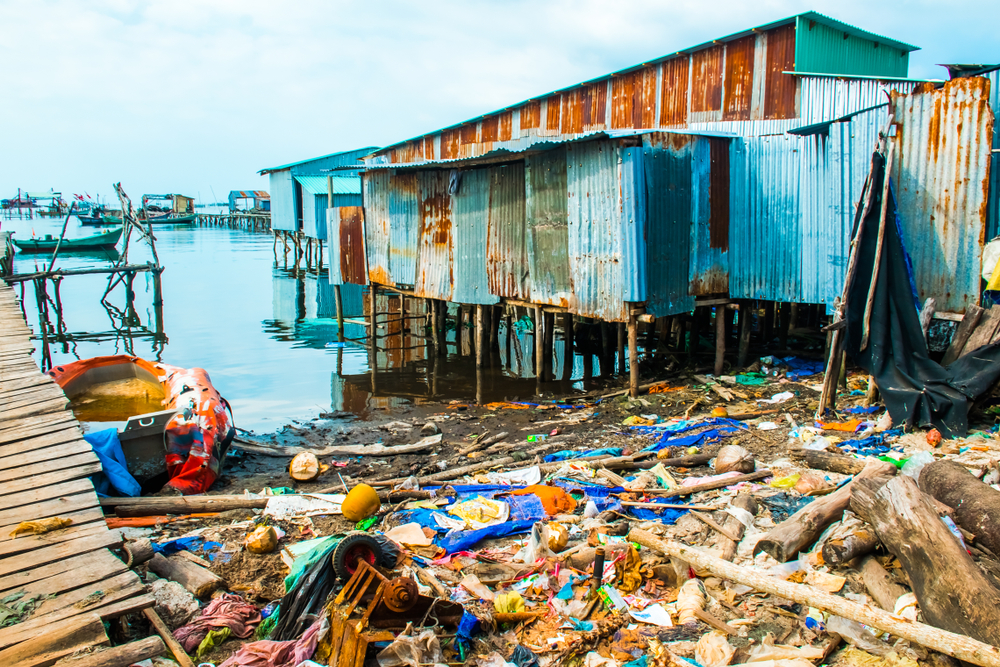Environmental Issues
Vietnam is facing a range of environmental challenges, which threaten the health and wellbeing of its citizens and ecosystems. Here are six of the most pressing environmental issues facing Vietnam:
- Deforestation: Deforestation is a major issue in Vietnam, as forests are being cleared for agriculture and development. This has led to soil erosion, loss of wildlife habitat, and reductions in the ability of forests to absorb carbon and regulate the local climate.
- Water Pollution: Water pollution is a growing problem in Vietnam, as industrial and agricultural waste are contaminating rivers and other bodies of water. This has led to health problems for local residents, as well as reductions in the quality of water for drinking, fishing, and irrigation.
- Air Pollution: Air pollution is a significant issue in Vietnam, particularly in urban areas, as the country's rapid economic growth has resulted in increased levels of industrial and vehicular emissions. This has led to health problems for local residents, as well as reductions in visibility and reductions in the quality of life.
- Soil Erosion: Soil erosion is a major issue in Vietnam, as deforestation, overgrazing, and other forms of land use have led to reductions in soil fertility and increased rates of erosion. This has reduced agricultural productivity, as well as contributing to the loss of biodiversity and reductions in the ability of soils to store carbon.
- Waste Management: Waste management is a growing issue in Vietnam, as the country struggles to manage its growing levels of waste, particularly in urban areas. This has led to environmental contamination, health problems for local residents, and reductions in the quality of life.
- Climate Change: Climate change is a major issue in Vietnam, as rising temperatures and changes in precipitation patterns are affecting the country's ecosystems and its ability to produce food. This has led to reductions in agricultural productivity, increased flooding, and other impacts on local communities.
In conclusion, Vietnam is facing a range of environmental challenges that threaten the health and wellbeing of its citizens and ecosystems. Addressing these issues is crucial for reducing their impacts and ensuring a sustainable future for the country and its residents.
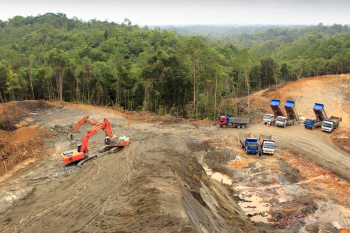
Deforestation
Deforestation in Vietnam has a significant impact on the country's environment. The loss of forests has wide-ranging consequences for the ecosystem and its inhabitants. Here are some of the most significant effects of deforestation in Vietnam:
- Loss of Biodiversity: Deforestation destroys the natural habitats of many species of plants and animals, causing a loss of biodiversity in the ecosystem.For example, in Vietnam, the loss of forests has resulted in the loss of several species of primates and other animals that are only found in the country.
- Soil Erosion: Trees help to hold soil in place, preventing it from being washed away during heavy rains. Without trees, soil erosion can become a major problem, leading to the loss of fertile soil and the degradation of the land.For example, this can be seen in many areas of Vietnam where large amounts of land have become unproductive due to severe soil erosion.
- Climate Change: Trees absorb carbon dioxide from the atmosphere, which helps to mitigate the effects of climate change.For example, deforestation in Vietnam releases large amounts of carbon dioxide into the atmosphere, exacerbating the effects of climate change and contributing to global warming.
- Water Shortages: Trees play a crucial role in regulating water flow in the ecosystem. By slowing the flow of water and allowing it to filter into the soil, they help to ensure a steady supply of water.For example, deforestation in Vietnam can lead to water shortages and increased flooding in some areas.
- Loss of Livelihoods: Deforestation in Vietnam often forces local communities to find new sources of income, as the forests are a source of livelihood for many people in the country.For example, this can lead to further degradation of the land, as people are forced to turn to farming and other activities that can be harmful to the environment.
- Increased Risk of Natural Disasters: Deforestation can increase the risk of natural disasters such as landslides, flash floods, and mudslides. This is especially true in areas that are prone to heavy rains, such as Vietnam. For example, in areas where forests have been cleared, the land is more susceptible to these types of disasters, which can cause significant damage to infrastructure and harm communities.
In conclusion, the effects of deforestation in Vietnam are far-reaching and can have serious consequences for the environment and local communities. Addressing the issue and working to restore forests is essential to preserving the country's unique biodiversity and protecting the ecosystem for future generations.
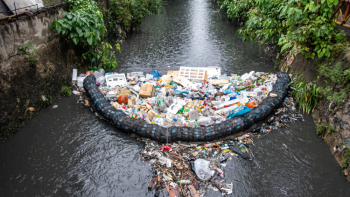
Water Pollution
Water pollution is a significant issue in Vietnam, affecting both the quality of life for its citizens and the country's natural resources. Here are six specific effects of water pollution in Vietnam:
- Impact on Human Health: Contaminated water can cause a range of health problems, including digestive and skin diseases, as well as respiratory and eye infections. For example, in the Red River Delta region, high levels of coliform bacteria have been found in the water supply, posing a serious risk to public health.
- Loss of Biodiversity: Polluted water can harm aquatic plants and animals, leading to a decline in biodiversity. For instance, in the Mekong Delta, the expansion of intensive agriculture and aquaculture has led to the overuse of pesticides and fertilisers, which are contaminating the water and killing off fish and other aquatic species.
- Decline in Fish Populations: Fish populations can also be affected by water pollution, as contaminated water makes it difficult for fish to survive.For example, in the Mekong Delta, the loss of fish populations has had a major impact on local fishing communities, who rely on the river for their livelihoods.
- Damage to Agricultural Land: Contaminated water can also lead to the degradation of agricultural land, as it can make it difficult for crops to grow and can contaminate the soil. In the Red River Delta, for example, excessive use of chemicals in agriculture has led to soil degradation and reduced crop yields.
- Impact on Tourist Industry: Water pollution can also have a negative impact on tourism, as it can make beaches and other tourist attractions less appealing.For example, in some parts of Vietnam, the declining quality of coastal waters has led to a decrease in tourists visiting the area.
- Reduced Water Supply: Finally, water pollution can also reduce the availability of clean water for human consumption, as well as for industrial and agricultural use.For example, in many parts of Vietnam, the declining quality of water resources has led to a reduction in the amount of water that can be safely consumed or used for other purposes.
In conclusion, water pollution is a serious issue in Vietnam, with far-reaching effects on both the environment and the well-being of the country's citizens. Addressing this problem will require a coordinated effort on the part of the government, industry, and the public to reduce the sources of pollution and protect the country's water resources.
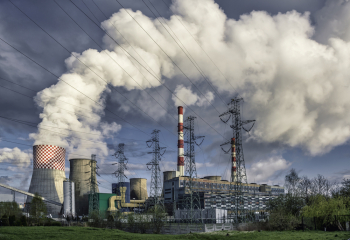
Air Pollution
Air pollution has become a serious problem in Vietnam, affecting both the health of the population and the environment. Here are six specific effects of air pollution in Vietnam:
- Decreased air quality: One of the most noticeable effects of air pollution in Vietnam is decreased air quality.For example, this can result in various health problems, such as respiratory problems and heart disease, especially in urban areas where pollution levels are highest.
- Impact on agriculture: Air pollution can have a negative impact on agriculture, including damage to crops and soil, and reductions in crop yields.For example, in Vietnam, the increasing levels of air pollution, especially in industrial areas, are having a significant impact on local farmers.
- Adverse effects on wildlife: The effects of air pollution can extend to wildlife and other ecosystems. Exposure to air pollutants can lead to harm to sensitive species, altering their habitat and reducing biodiversity. For example, studies have shown that air pollution from factories and automobiles has affected the health of aquatic species in Vietnam, such as fish and crustaceans.
- Damage to cultural heritage: Air pollution can also have a damaging effect on cultural heritage sites, such as temples and monuments.For example, the accumulation of pollutants in the atmosphere can lead to corrosion and discoloration of these structures.
- Health impacts: Exposure to air pollutants, such as particulate matter, sulfur dioxide, and nitrogen oxides, can have serious health impacts, including respiratory and heart problems. These pollutants can cause inflammation and oxidative stress in the body, leading to long-term health problems.For example, in Vietnam, air pollution has been linked to increasing rates of respiratory diseases, especially in urban areas.
- Reduced visibility: Air pollution can also reduce visibility, making it more difficult to see, especially in areas with high levels of smog.For example, this can be particularly dangerous for drivers and other motorists, leading to reduced road safety.
In conclusion, air pollution is a major environmental problem in Vietnam that has far-reaching effects on both human health and the environment. Addressing this issue will require a multi-faceted approach, including the development of more sustainable transportation options, improved industrial practices, and better waste management strategies.
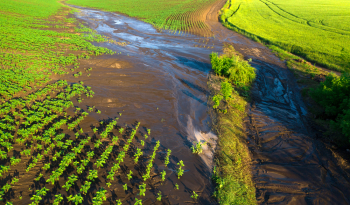
Soil Erosion
Soil erosion is a serious environmental issue in Vietnam, where widespread deforestation and improper agricultural practices have led to severe degradation of the country's natural resources. The following is a list of some of the significant effects of soil erosion in Vietnam.
- Loss of Soil Fertility: Soil erosion can cause a decline in soil fertility by removing fertile topsoil, reducing the amount of organic matter in the soil, and reducing the availability of nutrients to plants. For example, in the Northern provinces of Vietnam, intensive cultivation of crops such as rice and maize has resulted in soil degradation and a decline in soil fertility.
- Reduced Agricultural Productivity:Soil erosion can significantly reduce the productivity of agricultural land. For example, in the Mekong Delta, the most fertile agricultural area in Vietnam, soil erosion has led to reduced crop yields and decreased economic opportunities for farmers.
- Impacts on Water Resources:Soil erosion can have significant impacts on water resources, causing increased sedimentation in rivers and reservoirs, reducing water quality and availability for irrigation and other uses. For example, in the Red River Delta, soil erosion has led to increased sedimentation in rivers, reducing the effectiveness of dams and other water management infrastructure.
- Increased Flooding and Landslides:Soil erosion can increase the risk of flooding and landslides by reducing the stability of slopes and increasing the amount of runoff. For example, in the Central Highlands, extensive deforestation has led to increased soil erosion, which in turn has contributed to increased flooding and landslides.
- Habitat Destruction:Soil erosion can lead to the destruction of habitats, particularly for plants and animals that depend on stable soils and intact vegetation. For example, in the Central Highlands, soil erosion has led to the loss of primary forest cover, resulting in the decline of biodiversity and the destruction of habitats for wildlife.
- Economic Impacts:Soil erosion can have significant economic impacts, including reduced agricultural productivity, increased costs for soil conservation and rehabilitation, and the loss of natural resources and ecosystem services. For example, in the Red River Delta, the economic costs of soil erosion are estimated to be in the tens of millions of dollars annually.
In conclusion, soil erosion is a serious environmental issue in Vietnam, with far-reaching effects on the country's natural resources, economic stability, and quality of life. Addressing soil erosion requires a multi-faceted approach that includes reducing deforestation, improving agricultural practices, and investing in soil conservation and rehabilitation measures.
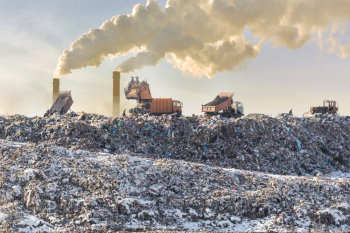
Waste Management
Waste management is a significant environmental issue facing Vietnam, with the country struggling to handle its increasing waste generation. The lack of proper waste management practices can result in a range of negative effects on the environment and public health. Here are six specific effects of waste management in Vietnam:
- Contamination of Soil and Water Resources:Poor waste management practices in Vietnam can result in the contamination of soil and water resources, leading to harm to local ecosystems and wildlife, and reducing the quality of drinking water. For example, hazardous waste such as electronics and batteries are often dumped in landfill sites without proper treatment, leading to the release of toxic chemicals into the soil and groundwater.
- Health Risks to Local Communities:Inadequate waste management practices can pose serious health risks to local communities. For example, open dumping of waste near residential areas can result in the release of toxic gases and attract disease-carrying insects, putting local residents at risk.
- Marine Degradation: Vietnam is known for its picturesque coastlines and abundant marine life, but improper waste disposal practices can harm this delicate ecosystem.For example, improper disposal of plastic waste and other pollutants into rivers and coastal waters can result in serious harm to marine life, including entanglement, ingestion, and habitat destruction.
- Loss of Biodiversity: Lack of proper waste management practices can also result in the loss of biodiversity,For example, as wildlife is negatively impacted by contaminated soil and water resources, and their habitats are destroyed.
- Air Pollution: Open burning of waste releases harmful pollutants into the air, leading to increased levels of air pollution and the release of harmful gases such as carbon monoxide, nitrogen oxides, and particulate matter. For example, this can have serious impacts on human health and lead to respiratory problems and other health issues.
- Climate Change: Finally, waste management practices can also contribute to climate change by releasing greenhouse gases into the atmosphere. For example, methane and carbon dioxide result from decomposing waste in landfills.
In conclusion, waste management is a critical environmental issue in Vietnam, and addressing it requires a multi-faceted approach that involves the government, businesses, and communities working together to find sustainable and effective solutions. Effective waste management practices can help to reduce the negative impacts of waste on the environment and public health, preserving Vietnam's unique and beautiful ecosystems for future generations.

Climate Change
Climate change is one of the most pressing environmental issues affecting the world today, including the country of Vietnam. As temperatures continue to rise, the impacts on the environment, economy, and human health in Vietnam are becoming increasingly evident. Here are six specific effects of climate change on the environment in Vietnam:
- Increased frequency and severity of extreme weather events: In Vietnam, the effects of climate change are already apparent in the form of more frequent and intense natural disasters, such as typhoons, flash floods and landslides. For example, Typhoon Damrey in 2017 resulted in more than 120 deaths and caused extensive damage to properties and infrastructure in central Vietnam.
- Changes in precipitation patterns: Vietnam's climate is characterized by two main rainy seasons, but climate change is causing changes in precipitation patterns, leading to unpredictable and uneven rainfall. For example, this puts stress on agriculture, as farmers are unable to plan and plant crops in the traditional way, leading to food security concerns.
- Sea level rise: Vietnam is one of the countries most vulnerable to sea level rise, as it has a long coastline and much of the population lives in low-lying areas.For example, this is causing significant damage to the country's agriculture, coastal infrastructure, and properties.
- Drying up of lakes and rivers:Vietnam has seen the drying up of many of its rivers and lakes as a result of rising temperatures and changes in precipitation patterns.For example, this is affecting local communities who rely on these waterways for fishing, irrigation, and drinking water.
- Spread of diseases: Rising temperatures and changes in precipitation patterns are creating new habitats for disease-carrying insects, For example,mosquitoes and ticks, leading to an increase in the spread of diseases like dengue fever, chikungunya and zika.
- Loss of biodiversity: Vietnam is home to many unique and endangered species, including tigers, elephants, and primates. As the country's forests are logged and destroyed, these species are facing increased threat of extinction,For example, and the loss of biodiversity is having a negative impact on the ecosystem and local communities who depend on these resources.
In conclusion, the effects of climate change are already being felt in Vietnam, and the country is facing significant challenges as a result. It is vital that action is taken to mitigate the impacts of climate change and protect the environment for future generations. This can be done through reducing greenhouse gas emissions, promoting sustainable development, and implementing adaptation measures to help communities and ecosystems to become more resilient in the face of these challenges.
Copyright © 1993–2025 World Trade Press. All rights reserved.

 Vietnam
Vietnam 